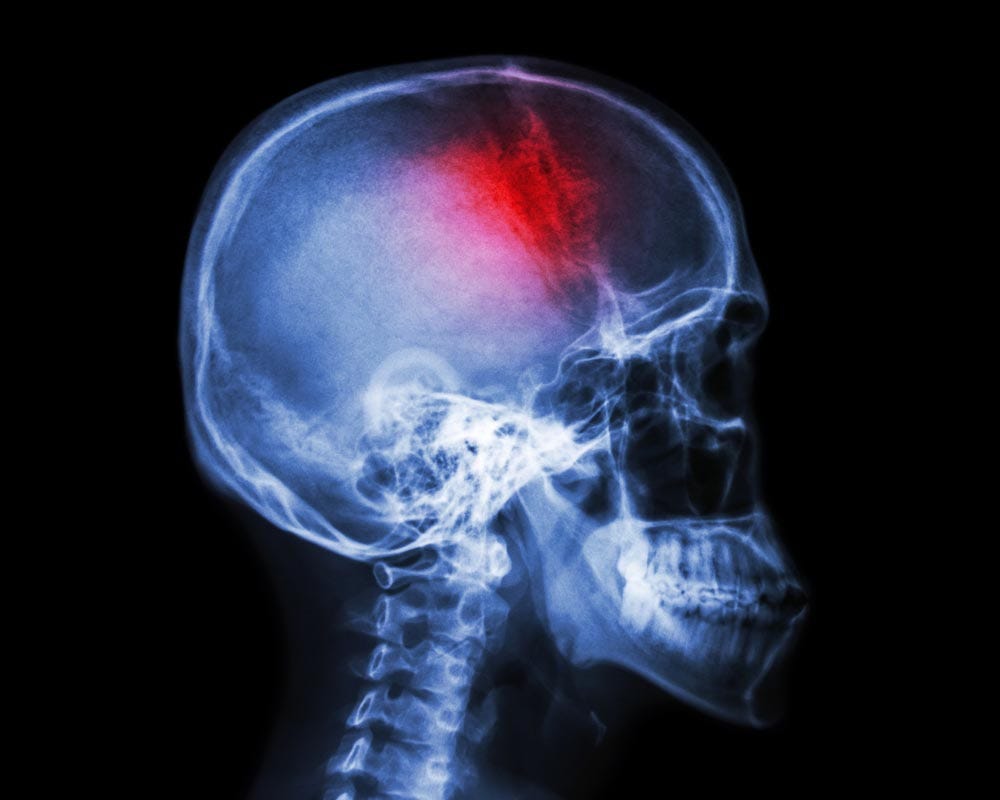My (Alleged) Mini-Stroke
Howdy! I'm Keith Ward, and this is my newsletter about the ups and downs of growing old. If you like it, please subscribe (and pass it along to others, too).
Let's get to it...
-----
The shock in Kathy’s voice was clear. “Keith, you’re slurring your words.”
I was talking to my wife on the phone. She was at work, and I was home. We’d only been talking a few seconds, and she said I wasn’t speaking clearly. The thing was, I didn’t think I was slurring at all. I felt perfectly normal.
Kathy, who’s a doctor, was convinced that something was wrong. This was 2021, in the middle of the pandemic. We kept talking, and she got more concerned. She wanted my daughter, who was in the house and also had medical training, to listen to me. My daughter agreed with Kathy that I wasn’t speaking normally.
I was just as confident that nothing was wrong. I recorded video of myself talking, and played it back. It sounded normal.
A few minutes later, my daughter was driving me to the hospital. Kathy believed I may have suffered a TIA, or “transient ischemic attack.” I continued to feel exactly the same, and wondered what all the fuss was about.
(Note: Kathy tells me that she wanted me to go in an ambulance, and I resisted. I don’t remember it happening that way, but her memory is better than mine. In any event, I *should* have gone in an ambulance, and so should you, if you have any symptoms. It’s crucial to get help as soon as possible.)
A TIA is described by the Mayo Clinic as a “temporary period of symptoms similar to those of a stroke. A TIA usually lasts only a few minutes and doesn't cause permanent damage.” That’s why it’s sometimes called a “mini-stroke.”
We got to the hospital within 15 minutes. Once there, I was immediately rushed into a treatment room. They don’t mess around with potential TIAs, and a swarm of doctors and nurses started working on me.
I was put through a gamut of tests: my face was closely examined for any drooping or paralysis. My arms were checked for weakness. As a memory test, I was presented with flash cards with pictures on them, which I had to identify—over and over and over. I’d memorized them by the time I’d left.
For at least an hour I was closely monitored by a half-dozen people trained to look for signs of impairment. And, to a person, they said I was normal. They didn’t hear anything wrong with my speech. None of the other symptoms, like numbness or weakness in limbs, an inability to understand others, blindness or double vision, or coordination problems, were present.
This did not mean, as Kathy pointed out, that I didn’t have a TIA. It could have been over within minutes, and I’d started to recover by the time I got to the hospital. That’s not unusual in these cases.
I was kept in the hospital overnight, and went through another battery of tests, this time via machines: an MRI, an x-ray, a CT scan. Every test came back negative, and showed no problems with my brain.
This still didn’t mean I didn’t have a TIA. A victim may not have any lasting effects. As the Mayo Clinic says, “Transient ischemic attacks usually last a few minutes. Most signs and symptoms disappear within an hour.”
I checked the video of myself talking that I’d taken at the time Kathy said I was slurring. I didn’t see anything. But she knows me better than anyone on earth, and as a medical professional, is trained to see these things. That, along with agreement from my daughter, is strong evidence that something happened.
And even with all that, I still remain unconvinced that I had a TIA. This is strong evidence that I’m an idiot. It does seem to be something of a puzzle, in that I checked the video several times well after the incident was over, and couldn’t see any difference. It may have been that even by the time I recorded myself, the TIA had passed. It appears that it could remain a mystery as to what happened.
A TIA can be a precursor to a stroke, and about a third of those who have one then have a stroke, and often soon after. Also, I’m not a young man, and have a number of health issues.
Fortunately, no stroke happened (nor have I had any more issues related to the episode), and life has gone on normally for me since then.
It’s been awhile since I thought of that day. It could have gone much worse, and the prompt action of my wife and daughter to get me to the hospital could have been life-saving if the worst had happened.
To be perfectly honest, I continue to wonder whether I actually did have a TIA. But the lesson is clear: assume the worst rather than the best. Get checked out if you have symptoms, no matter how brief.
(If you’ve had a TIA, and are comfortable talking about the experience, let me know in the comments below.)



Never wait!